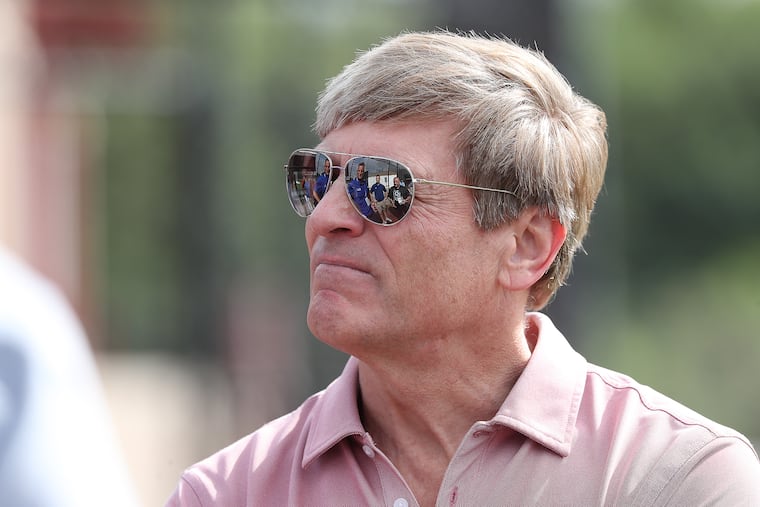Phillies owner John Middleton won’t treat luxury tax as deterrent — if GM Matt Klentak can make right move | Scott Lauber
Middleton has shown a willingness to spend.

CLEARWATER, Fla. — Since 2016, the Phillies’ payroll, calculated for luxury-tax purposes, has risen from $103 million to $119 million in both 2017 and ’18 and to $194 million last year. As it stands today, six weeks from opening day in Miami, they are at nearly $203 million, a franchise-record sum.
So, let's not pretend that owner John Middleton hasn't put his money where his mouth was a few years ago when he vowed to someday reclaim the World Series trophy.
Now, though, the question is how far the Phillies will go. There is no salary cap in baseball, only a competitive-balance threshold that all teams are free to clear as long as they are willing to pay a surcharge on every dollar spent beyond $208 million. Since MLB and the players’ union agreed on the system in 1997, the Phillies have never crossed into tax territory.
Perhaps that’s why the assumption is that Middleton finally shut off the spigot after green-lighting the signing of free agents Carlos Santana (three years, $60 million) and Jake Arrieta (three years, $75 million) before the 2018 season; Andrew McCutchen (four years, $60 million), David Robertson (two years, $23 million), and Bryce Harper (13 years, $330 million) last year; and Zack Wheeler (five years, $118 million) and shortstop Didi Gregorius (one year, $14 million) in December.
» READ MORE: Phillies’ Jake Arrieta believes improved health will keep him from becoming $75 million disappointment
The Phillies largely sat out the final six weeks of the offseason, even though they still lack starting pitching depth and questions persist about the bullpen.
But general manager Matt Klentak said Thursday that Middleton hasn't explicitly directed him to keep the payroll below the luxury tax. If there's a move that is simultaneously sensible and helpful to ending the Phillies' eight-year playoff drought, Klentak insisted he's authorized to pursue it to the point of seeking ownership's approval.
"I don't think it's a barrier. I think it's a guide," Klentak said of the $208 million marker. "There have been a couple instances the past few years where we have done that and brought it to them and we've decided to exceed whatever our internal budget was to make that move. I certainly believe them when they say that [is still the case]."
Middleton indicated as much in October, when he said he would be willing to pay the tax if the Phillies have a chance of winning more than the National League’s second wild card. And the team’s strong desire to work out a multiyear extension with All-Star catcher J.T. Realmuto could take them over the threshold in 2021 even if they don’t acquire another marquee player any time soon.
To hear Klentak tell it, then, the Phillies' inaction in January was more the result of not identifying a high-impact move that made sense than Middleton's holstering his wallet.
Sign free-agent third baseman Josh Donaldson? Not for four years and $92 million, a contract that would have blocked top prospect Alec Bohm’s path to the big leagues. Sign 33-year-old lefty Hyun-Jin Ryu? Not for the four years that he received from the Toronto Blue Jays.
» READ MORE: Matt Klentak says Phillies ‘absolutely’ have enough pitching
The Phillies could still pull off a trade for, say, Chicago Cubs third baseman Kris Bryant, who will make $18 million this year and more in 2021 before being eligible for free agency. Klentak didn’t slam the door on such a move even though it would push the Phillies beyond $208 million, but he indicated it was unlikely and stressed the usual platitudes about having faith in the group of players in camp.
Left unsaid was that trading for Bryant could mean giving up top pitching prospect Spencer Howard and Bohm, a nonstarter for an organization that hasn't developed nearly enough impact players from within over the last several years.
» READ MORE: Phillies manager Joe Girardi optimistic as first spring training begins | Bob Brookover
"You can be sure that when a player from another club is perceived to be available that the Phillies have checked in on that player," Klentak said. "In some cases, we have exchanged offers with that team — both made offers and received counteroffers. I'm not going to say specifically that that's about one player or another player, but our responsibility is to explore that.
“We never got to the point of really asking ownership about [any moves] because we never lined up a baseball trade that we thought was right. But I think if we ever got to that point — whether it’s before the season, at the trade deadline, in 2021 — I would expect to have a good, productive dialogue with our owners about that. I don’t necessarily see it as a hard barrier.”
Nothing about Middleton’s recent behavior as an owner suggests that it actually will be.
Then again, if $208 million can’t buy enough talent to make the playoffs, maybe the problem is more about how the money is being spent than how much.